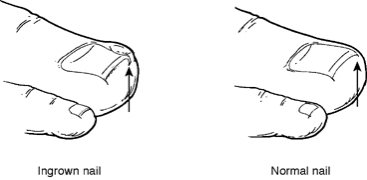Ingrown toenails can happen to people of all ages. While they may seem like a small and insignificant problem, leaving an ingrown toenail untreated can lead to serious complications, like infections and in a worst-case scenario…. amputation. If you are wondering what causes them, how to know if you have one, and what the treatment options are, then we have you covered. Read on for valuable insights and practical tips to keep your feet healthy and happy!
What are Ingrown Nails?
It is no surprise to know your nails are constantly growing. Ingrown toenails occur when the nail starts growing into the skin at the nail borders. When this happens, it causes different degrees of pain, redness, tenderness, and inflammation. Once the nail breaks the skin, it can lead to an infection. While ingrown toenails are more common in the big toe, they can affect any toenail.

What Causes Ingrown Toenails?
Ingrown toenails can happen for a number of reasons, such as:
- Genetics: If your parents had issues with ingrown toenails, you are more likely to experience them as well.
- Trauma: Injuries to the toenail, such as stubbing your toe, kicking, or running, can cause the nail to grow abnormally and become ingrown.
- Improper nail cutting: Cutting your toenails too short or rounding the edges can cause the nail to dig into the skin.
- Tight shoes and socks: Wearing shoes or socks that are too tight can put pressure on the toes and cause the nail to grow into the skin.
- Fungal infections: Fungal infections can cause thickened nails that are more likely to become ingrown.

How Are Ingrown Toenails Treated?
At Metro Tulsa Foot & Ankle Specialists, we do not recommend home treatment of ingrown toenails, especially if you have nerve and poor circulation disorders or diabetes, which can put you at a higher risk for complications. We strongly advise against trying to remove or perform surgery on the nail yourself, because this can make the problem worse.
If you have an ingrown toenail, it’s best to seek professional help, especially if you notice signs of infection such as pus or redness. By getting professional help, you have a greater chance of eliminating future ingrown toenails.
In our office, we typically remove the problem nail partially or completely under local anesthesia. Permanent removal of the nail involves applying a liquid chemical to the nail bed that prevents it from growing back in that spot.
How Can You Prevent Ingrown Toenails?
Preventing ingrown toenails is always better than treating them. Here are some tips to keep your toenails healthy:
- Wear properly fitted shoes and socks, especially when participating in activities that increase pressure on your feet, such as running.
- Trim your toenails straight across and avoid rounding the edges.
- Don’t cut your toenails too short.
- Keep your feet clean and dry, especially between the toes.
- Avoid picking at your toenails or tearing off hangnails.
Ingrown toenails are a common problem, and although they might seem insignificant when they first appear, they can lead to serious complications if left untreated. If you have an ingrown toenail, don’t attempt to perform surgery on it yourself – seek professional help instead and schedule an appointment at one of our five Tulsa metro locations. And remember, prevention is always better than treatment, so take good care of your feet and toenails to avoid ingrown nails in the first place.
Subscribe to stay up-to-date on news and tips from us.





